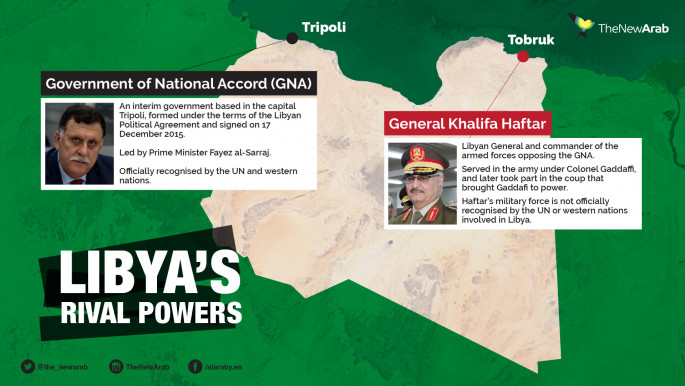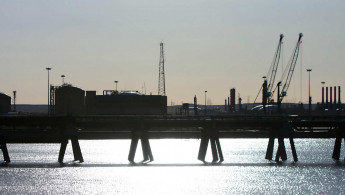Libya oil output slashed as Haftar loyalists blockade ports
Haftar's forces and tribes loyal to the rogue general reportedly threatened the blockade on oil exports over a mulled Turkish intervention in Libya.
2 min read
More than half of the country's oil output has been cut [Getty]
Eastern Libyan ports controlled by rogue general Khalifa Haftar have stopped exports, cutting the country's oil output by more than half, Reuters reported.
The move comes ahead of a Berlin summit on Sunday in which Germany and the United Nations will try to persuade Haftar and his foreign backers to call off the strongman's assault on Tripoli.
Haftar and his self-styled Libyan National Army (LNA) launched a campaign to take the Libyan capital in April last year. Tripoli is held by the internationally recognised Government of National Accord (GNA), headed by Prime Minister Fayez al-Sarraj.
Tribesman in areas of the country controlled by the LNA stormed the Zueitina oil export port on Friday, announcing the closure of all terminals under the control of Haftar's forces.
The LNA and an eastern oil protection force ordered the closure of the ports, a source in state oil company NOC told Reuters. The oil protection forces later said it had halted all oil exports.
Earlier on Friday, tribes close to Haftar and his forces had threatened a blockade on oil export terminals in protest against a proposed Turkish intervention in the country.
Blocking oil exports will "dry up the sources of funding for terrorism via oil revenues", the head of the Zouaya tribe told AFP.
Turkey dispatched dozens of military advisors to Tripoli earlier this month as part of a mulled intervention in the conflict. Ankara is a key backer of Sarraj's government and has reportedly also recruited Syrian rebels to fight on behalf of the GNA if a lasting truce is not reached.
A spokesman for the LNA denied the blockade was a coordinated action by Haftar's forces, telling Al-Hadath television on Friday that "the closure of the fields and the terminals is purely a popular decision".
"It is the people who decided this," Ahmed Mismari said.
The oil sector is Libya's main source of income. Some fear a lasting shutdown of the terminals will prompt economic collapse.
"The oil and the oil facilities belong to the Libyan people. They are not cards to be played to solve political matters," said NOC chairman Moustafa Sanalla. "This is like setting fire to your own house."
"We face collapse of the exchange rate, a huge and unsustainable increase in the national deficit, the departure of foreign contractors, and the loss of future production, which may take years to restore," Sanalla explained.
Follow us on Twitter and Instagram to stay connected
The move comes ahead of a Berlin summit on Sunday in which Germany and the United Nations will try to persuade Haftar and his foreign backers to call off the strongman's assault on Tripoli.
Haftar and his self-styled Libyan National Army (LNA) launched a campaign to take the Libyan capital in April last year. Tripoli is held by the internationally recognised Government of National Accord (GNA), headed by Prime Minister Fayez al-Sarraj.
Tribesman in areas of the country controlled by the LNA stormed the Zueitina oil export port on Friday, announcing the closure of all terminals under the control of Haftar's forces.
The LNA and an eastern oil protection force ordered the closure of the ports, a source in state oil company NOC told Reuters. The oil protection forces later said it had halted all oil exports.
Earlier on Friday, tribes close to Haftar and his forces had threatened a blockade on oil export terminals in protest against a proposed Turkish intervention in the country.
Blocking oil exports will "dry up the sources of funding for terrorism via oil revenues", the head of the Zouaya tribe told AFP.
 |
| [Click to enlarge] |
Turkey dispatched dozens of military advisors to Tripoli earlier this month as part of a mulled intervention in the conflict. Ankara is a key backer of Sarraj's government and has reportedly also recruited Syrian rebels to fight on behalf of the GNA if a lasting truce is not reached.
A spokesman for the LNA denied the blockade was a coordinated action by Haftar's forces, telling Al-Hadath television on Friday that "the closure of the fields and the terminals is purely a popular decision".
"It is the people who decided this," Ahmed Mismari said.
The oil sector is Libya's main source of income. Some fear a lasting shutdown of the terminals will prompt economic collapse.
"The oil and the oil facilities belong to the Libyan people. They are not cards to be played to solve political matters," said NOC chairman Moustafa Sanalla. "This is like setting fire to your own house."
"We face collapse of the exchange rate, a huge and unsustainable increase in the national deficit, the departure of foreign contractors, and the loss of future production, which may take years to restore," Sanalla explained.
Follow us on Twitter and Instagram to stay connected





 Follow the Middle East's top stories in English at The New Arab on Google News
Follow the Middle East's top stories in English at The New Arab on Google News


